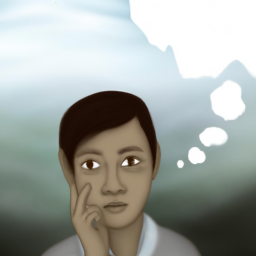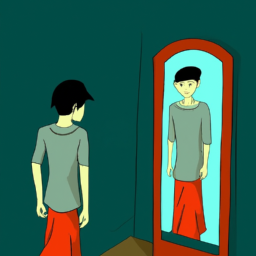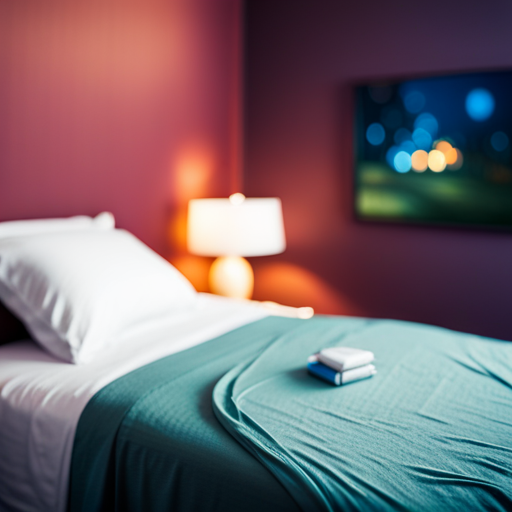The text translated to English (United States): According to the old saying, ‘I need to pinch myself to make sure I’m not dreaming.’
But lately, I have been feeling the opposite. My dreams have been so vivid and lifelike that I wake up questioning reality. It’s a strange and unsettling feeling that has left me wondering why my dreams have felt so real lately.
At first, I thought it was just a fluke. Maybe I had eaten something strange before bed or was under a lot of stress. But as the nights passed, my dreams continued to be just as vivid.
I decided to do some research and found that there are several possible explanations for why my dreams have been so lifelike. In this article, I will delve into the various reasons why dreams can feel so real, from stress and anxiety to sleep disorders and even lucid dreaming.
Key Takeaways
- Vivid dreams can be caused by stress, anxiety, sleep disorders, medications, and substance use.
- Sleep hygiene, diet and exercise, and relaxation techniques can improve the quality of sleep and reduce the intensity of dreams.
- Lucid dreaming is a state of consciousness where one can control the content of their dreams, but caution should be taken as it can be overwhelming and different techniques have varying levels of effectiveness.
- Healthcare professionals can provide additional help and keeping a dream journal can help process and understand intense dreams.
Stress and Anxiety
You’ve been feeling extra stressed and anxious lately, which can cause your dreams to feel more vivid and lifelike. When you’re under a lot of stress, your brain can become hyperactive and it can be difficult to shut off your thoughts, even when you’re sleeping.
This can lead to more intense dreams that feel like they’re actually happening. Anxiety can also affect the content of your dreams. If you’re worried about something in particular, it’s possible that your brain will try to work through those issues while you’re asleep.
This can result in dreams that feel very real and emotionally charged. However, if you’re experiencing these types of dreams on a regular basis, it could be a sign of an underlying sleep disorder.
Sleep Disorders
I’ve been experiencing some strange dreams lately, and it got me thinking about sleep disorders and how they impact our dreams.
From insomnia to sleep apnea, there are various types of sleep disorders that can affect the quality and quantity of our sleep.
And as we know, the quality of our sleep can greatly impact our dream experiences.
Overview of Sleep Disorders
As we all know, sleep disorders can greatly affect the quality of our dreams, making them feel more vivid and real than usual. There are many different types of sleep disorders that can impact our sleep and ultimately affect the way we dream.
Here are a few examples:
- Insomnia: This is a common sleep disorder that makes it difficult to fall asleep or stay asleep throughout the night.
- Sleep apnea: This disorder causes the airway to become blocked during sleep, leading to pauses in breathing and disrupted sleep.
- Narcolepsy: This is a neurological disorder that causes excessive daytime sleepiness and sudden, uncontrollable episodes of falling asleep.
While these disorders may seem unrelated to the vividness of our dreams, they can actually have a significant impact on our dream experiences. Understanding how they impact dreams can help us better manage these conditions and improve our overall sleep quality.
How They Impact Dreams
Understanding the impact of sleep disorders on your dream experiences can provide valuable insight into the underlying causes of your vivid dreams. For example, if you suffer from sleep apnea, your brain may not be receiving enough oxygen while you sleep, which can cause you to wake up frequently throughout the night. These frequent awakenings can disrupt your sleep cycle and prevent you from entering the deep stages of sleep where your dreams occur.
As a result, when you do finally enter the REM stage of sleep where dreams are most common, your brain may compensate by producing more vivid and intense dreams. Other sleep disorders, such as restless leg syndrome or narcolepsy, can also impact your dream experiences.
In the case of restless leg syndrome, the constant urge to move your legs can cause you to wake up frequently throughout the night, preventing you from entering deep sleep. And with narcolepsy, the sudden and uncontrollable urge to fall asleep during the day can disrupt your sleep cycle and cause you to enter the REM stage of sleep more frequently, leading to more vivid and intense dreams.
Understanding how these disorders impact your sleep can help you better manage your symptoms and improve the quality of your sleep and your dream experiences. Speaking of which, let’s discuss how medications can impact your dreams.
Medications
Medications can affect the vividness of dreams, with up to 25% of people experiencing vivid and realistic dreams while taking certain medications. I’ve been taking medication for my anxiety, and I’ve noticed that my dreams have become more vivid and intense lately. It can be jarring to wake up feeling like I just lived through a whole other reality, but I’ve learned that this is a common side effect of my medication.
Here are some ways that medications can affect our dreams:
- They can increase brain activity during sleep, leading to more vivid dreams
- They can alter neurotransmitters in the brain, affecting dream content
- They can cause disruptions in REM sleep, which is when we have the most vivid dreams
- They can cause drowsiness during the day, leading to more intense and vivid dreams at night
- They can interact with other medications, compounding the effects on dream vividness
As someone who has experienced the impact of medication on my dreams firsthand, it’s important to be aware of how medications can affect our sleep and dream experience. However, medication isn’t the only factor that can affect dream vividness. Substance use is another potential factor that can impact our dreams, which I’ll explore in the next section.
Substance Use
I’ve been curious about how substance use affects my dreams lately. From my own experience, I’ve noticed that depending on what substance I use, my dreams can either feel more intense or completely nonexistent.
I’m interested in learning more about the science behind how substances affect our dreams.
Overview of Substance Use and Dreams
Although drugs and alcohol can affect the intensity and vividness of dreams, it’s important to note that substance use can also disrupt the normal sleep cycle and lead to less restorative sleep.
When we use substances, our body’s natural sleep rhythms can be disrupted, resulting in a decreased amount of time spent in deep, restful sleep. This can lead to an increase in vivid and intense dreams, as our brain tries to compensate for the lack of restorative sleep.
Additionally, certain substances, such as marijuana, can affect the REM stage of sleep, which is when most dreaming occurs. This can cause dreams to be more vivid and memorable, but also more prone to distortion and confusion.
Understanding how substance use affects dreams is important for those who use drugs or alcohol, as it can have a significant impact on their overall sleep quality and well-being. By reducing or eliminating substance use, individuals may be able to improve their sleep patterns and reduce the intensity of their dreams.
In the next section, we’ll explore some specific substances and how they affect dreams in more detail.
How They Affect Dreams
You’ll be surprised to know how different substances can impact the vividness and intensity of your dreams. For instance, alcohol is known to suppress REM sleep and can lead to less vivid dreams.
On the other hand, marijuana can increase the intensity of dreams and make them feel more real. This is because marijuana affects the neurotransmitters in the brain that regulate sleep and dreaming. As a result, it can lead to more intense and vivid dreams.
However, it’s important to note that the effects of substance use on dreams can vary from person to person. Some individuals may experience more intense dreams while others may not notice any difference at all.
Additionally, substance use can also have negative effects on overall sleep quality and can disrupt the natural sleep cycle. This is why it’s important to be mindful of the substances you consume and their potential effects on your sleep and dreams.
With that being said, let’s explore how diet and lifestyle can also impact the vividness and intensity of your dreams.
Diet and Lifestyle
By prioritizing a balanced diet and incorporating exercise into my routine, I’ve noticed that my dreams feel more real and vivid. This is because regular physical activity and a healthy diet can improve brain function, leading to better cognitive processing and memory storage.
When my brain is functioning optimally, my dreams are more likely to be detailed and memorable.
In addition to diet and exercise, there are other lifestyle factors that can impact the realism of my dreams, such as sleep hygiene. By creating a comfortable sleep environment, avoiding stimulants before bedtime, and establishing a consistent sleep schedule, I can improve the quality of my sleep and enhance the quality of my dreams.
Sleep Hygiene
I’ve been trying to figure out why my dreams feel so real lately, and I’ve been looking into all sorts of factors that could be contributing to this. One thing that I’ve been paying more attention to lately is my sleep hygiene, or lack thereof.
I’ve always been prone to staying up late and sleeping in, but I’m starting to realize that this might be affecting the quality of my sleep and my dreams. To improve my sleep hygiene, I’ve been trying to incorporate some new habits into my routine. Here are a few things that I’ve been doing that seem to be helping:
- Setting a consistent bedtime and wake-up time, even on weekends
- Avoiding caffeine and alcohol in the evening
- Creating a relaxing bedtime routine, such as reading or taking a warm bath
- Making sure my bedroom is cool, dark, and quiet
By focusing on these habits, I’m hoping to improve the quality of my sleep and see if that has any effect on the vividness of my dreams. And who knows, maybe I’ll even start experiencing lucid dreams!
Speaking of lucid dreaming, that’s another topic that I’ve been curious about lately.
Lucid Dreaming
Well, isn’t it just a barrel of laughs when your brain decides to play games with you in the middle of the night, like having a lucid dream where you suddenly realize you’re in control of the whole thing? Lucid dreaming is a state of consciousness where you are aware that you are dreaming and can control the dream’s content. It’s like being the director of your own movie, where you can change the plot, characters, and even the setting.
To experience a lucid dream, you need to have some level of self-awareness. You need to realize that you’re dreaming and that you have the power to control the dream. There are several techniques that you can use to induce lucid dreams, such as reality checks, where you question your surroundings to see if you’re dreaming, or wake-induced lucid dreaming, where you go back to sleep immediately after waking up. In the table below, I’ve listed some of the most common techniques used for lucid dreaming and their effectiveness.
| Technique | Effectiveness |
|---|---|
| Reality checks | Medium |
| Wake-induced lucid dreaming | High |
| Mnemonic induction of lucid dreams | Medium |
| Dream-initiated lucid dreaming | Low |
| Wake back to bed | High |
Lucid dreaming can be a fun and exciting experience, but it can also be a bit overwhelming. If you’re interested in exploring lucid dreaming, it’s important to do your research and approach it with caution. One way to make the most of your lucid dreams is to keep a dream journal, which will be discussed in the next section.
Dream Journaling
So, I’ve been having these incredibly vivid dreams lately, and it’s been really interesting to explore why that might be.
From what I’ve read, it could be related to stress, changes in sleep patterns, or even just a side effect of certain medications.
Regardless of the cause, I’ve found that keeping a dream journal has been really helpful in managing these intense dreams.
By writing down my dreams as soon as I wake up, I can better process and understand them, and hopefully get a better night’s sleep in the process.
Recap of Reasons for Vivid Dreams
Did you know that there are several reasons why our dreams can feel unusually vivid? One of the most common causes is simply the amount of time we spend in the REM (rapid eye movement) stage of sleep. This is when our brains are most active and dreams are most likely to occur. If we spend more time in REM sleep, we’re more likely to have vivid dreams.
Additionally, certain medications, foods, and substances can also increase the likelihood of vivid dreams. For example, some antidepressants, sleep aids, and even caffeine can affect our brain chemistry and lead to more intense dreams.
Another factor that can contribute to vivid dreams is stress. When we’re under a lot of stress, our brains are working overtime to process our emotions and thoughts. This can spill over into our dreams, making them feel more intense and realistic.
Finally, some people are simply more prone to vivid dreams than others, due to differences in brain chemistry or other factors. If you’re experiencing unusually vivid dreams, there are some tips for managing them that can help.
Tips for Managing Vivid Dreams
One way to cope with intense dreams is to practice relaxation techniques before bed. This can include deep breathing exercises, meditation, or gentle stretches. By calming your mind and body before sleep, you may be able to reduce the intensity of your dreams and wake up feeling more rested.
Another tip for managing vivid dreams is to establish a consistent sleep schedule. Going to bed and waking up at the same time each day can help regulate your sleep cycle and improve the quality of your sleep. Additionally, avoiding caffeine and alcohol before bed can also help reduce the likelihood of experiencing intense dreams.
If you continue to have vivid dreams despite these efforts, it may be helpful to speak with a healthcare professional.
Frequently Asked Questions
What is the most common type of dream people have?
The most common type of dream I have heard of is a "falling dream". It is when you feel like you are falling and then suddenly wake up with a start. However, this may not be true for everyone.
Can dreams predict the future?
Dreams cannot predict the future, but they can reveal subconscious thoughts and feelings. As a result, they may offer insight and guidance for present situations. However, it’s important to not solely rely on them for decisions.
Are nightmares more likely to occur during certain phases of the moon?
I don’t think there’s any scientific evidence to support the idea that nightmares are more likely to occur during certain phases of the moon. However, personal experiences may vary.
How long do most dreams last?
Funny you should ask, I’ve been wondering how long my dreams last lately. They can range from a few seconds to 30 minutes, but feel like hours. Maybe that’s why they feel so real.
Can changing your sleeping position affect the content of your dreams?
Yes, changing my sleeping position can affect the content of my dreams. Sleeping on my back can increase the likelihood of having vivid and intense dreams, while sleeping on my stomach can lead to more mundane dreams.
Conclusion
Lately, my dreams have been feeling incredibly vivid and real. It’s been a strange experience, but I’ve come to understand that there are several reasons why this could be happening.
Stress and anxiety play a big role, as well as sleep disorders, medications, substance use, and diet and lifestyle choices. By focusing on improving my sleep hygiene and practicing lucid dreaming and dream journaling, I hope to gain some control over my dreams and make them a more positive and enjoyable experience.
While this heightened sense of realism in my dreams can be unsettling at times, I’ve also found it to be a fascinating experience. Exploring the depths of my subconscious mind and uncovering hidden emotions and desires has been a journey of self-discovery.
Though it can be challenging, I’ve learned to embrace the vividness of my dreams and approach them with curiosity and wonder. In the end, I’ve come to appreciate the unique and complex nature of the human mind and the mysterious world of dreams.










